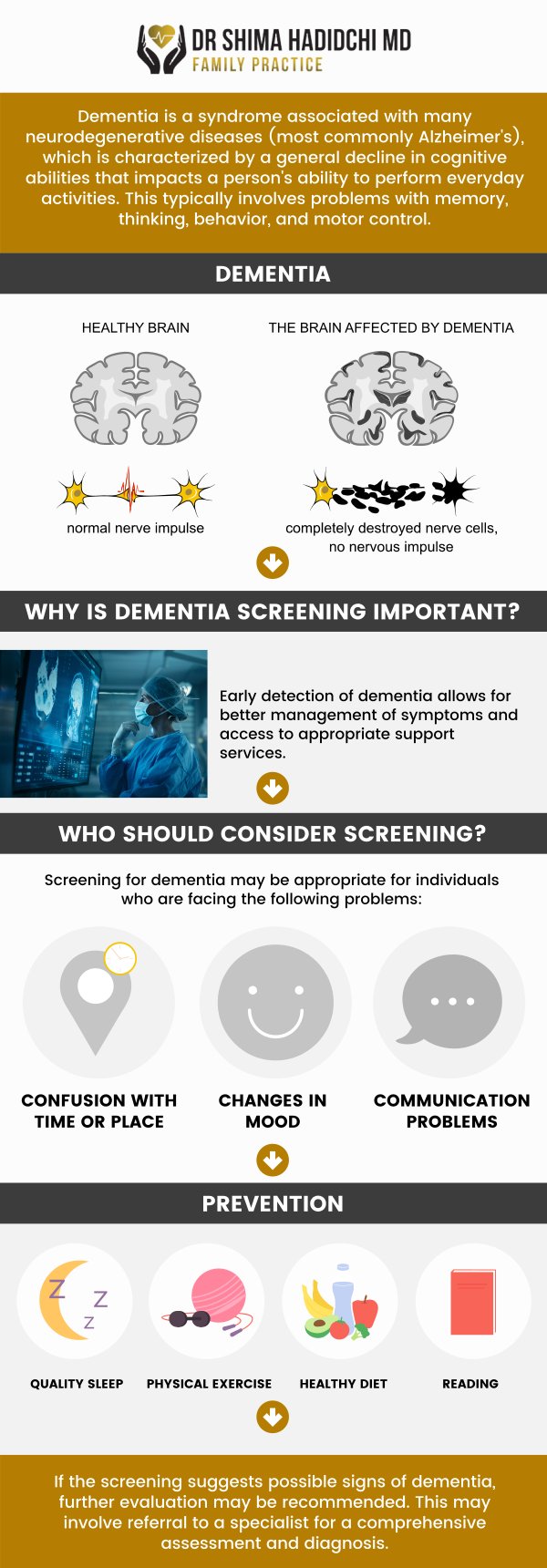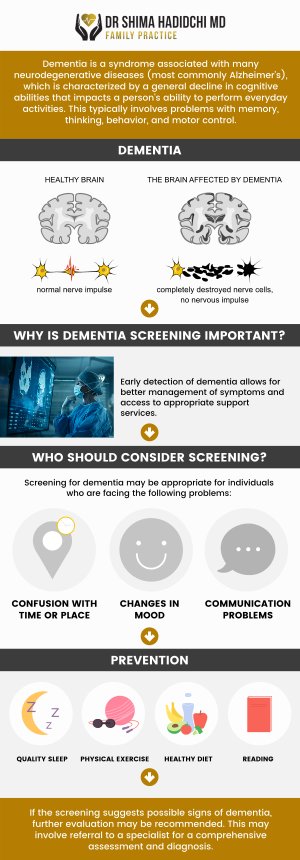Dementia Management in Victorville, CA
Dementia is a progressive condition that affects memory, thinking, and daily functioning, requiring specialized care and management. Board-Certified Physician Dr. Shima Hadidchi, MD, provides comprehensive dementia management services. We are committed to helping patients and their families navigate the challenges of dementia with personalized care and support at every stage of the condition. For more information, contact us or request an appointment online. We are conveniently located at 12740 Hesperia Rd, Suite A, Victorville, CA 92395.


Table of Contents:
What is dementia?
What are the early signs and symptoms of dementia?
What are the stages of dementia?
What is the difference between dementia and Alzheimer’s disease?
Dementia is an umbrella term for a group of symptoms that are severe enough to interfere with a person’s daily life. It is not a single disease but rather a syndrome caused by various diseases that damage brain cells and their connections. This damage leads to a decline in cognitive abilities—like thinking, remembering, and reasoning—that is more significant than what would be expected from normal aging.
The most common signs of dementia include memory loss, confusion, and difficulty with communication and problem-solving. It can also cause changes in a person’s mood, behavior, and personality. While it is more common in older adults, dementia is not a normal part of aging. There are many different types of dementia, with Alzheimer’s disease being the most common, followed by vascular dementia, Lewy body dementia, and frontotemporal dementia.
At Dr. Shima Hadidchi, MD, Family Practice Clinic, our goal is to help patients maintain their quality of life and independence for as long as possible. If you have concerns about memory loss or dementia for yourself or a loved one, we are here to provide guidance and support. Early intervention can provide clarity and help create the best possible care plan for you and your family.
At Dr. Shima Hadidchi, MD Family Practice Clinic, we understand how concerning it can be to notice changes in memory or behavior—either in yourself or a loved one. Dementia is a general term for a decline in cognitive function that interferes with daily life, and its early signs and symptoms can often be subtle and gradual. The early signs and symptoms of dementia can vary, but some common indicators include:
1. Memory loss: Frequently forgetting recent events, names, or appointments, and having difficulty recalling important information.
2. Difficulty with familiar tasks: Struggling to complete daily activities, such as managing finances, following a recipe, or driving to a familiar location.
3. Language problems: Difficulty finding the right words, repeating sentences, or struggling to follow or join in conversations.
4. Disorientation and confusion: Getting lost in familiar places, losing track of time, or forgetting where they are and how they got there.
5. Poor judgment: Making uncharacteristic decisions, such as dressing inappropriately for the weather or giving away large sums of money.
6. Personality or mood changes: Experiencing mood swings, irritability, depression, or anxiety, and acting in ways that are out of character.
7. Withdrawal from social activities: Losing interest in work, hobbies, or socializing, and avoiding previously enjoyable activities.
These early symptoms can be subtle and may progress over time, so seeking medical evaluation is important when they persist or worsen. At Dr. Shima Hadidchi, MD Family Practice, we emphasize the importance of early evaluation. For you or your loved ones experiencing any of these symptoms, we encourage an appointment to be made. We are committed to comprehensive care for all aspects of your health.
Dementia is a progressive condition that impacts memory, thinking, behavior, and the ability to manage daily activities. It is a progressive condition, and its progression is often described in stages to help caregivers and medical professionals understand the changes to expect. While different staging systems exist, a common model divides the progression into three main stages: early, middle, and late.
Early Stage (Mild Dementia)
In this stage, symptoms are often mild and can be subtle. The individual may still be able to function independently, but friends and family may begin to notice changes. Common signs include:
• Memory lapses, such as forgetting familiar words or names.
• Difficulty with planning, organizing, or solving problems.
• Challenges with performing complex tasks like managing finances or preparing meals.
• Misplacing objects more frequently.
Middle Stage (Moderate Dementia)
This is typically the longest stage of dementia, and symptoms become more pronounced and can be disruptive to daily life. The individual will require more assistance and supervision. Common signs include:
• Significant memory loss, such as forgetting personal history or important life events.
• Increased confusion and disorientation, including getting lost in familiar places.
• Changes in personality and behavior, such as becoming moody, withdrawn, or suspicious.
• Difficulty with personal care, like dressing or bathing.
Late Stage (Severe Dementia)
In the final stage, the individual’s cognitive and physical abilities decline significantly. They require full-time, around-the-clock care and assistance with all daily activities. At this point, the person may lose the ability to communicate, respond to their environment, or even walk. The focus of care in this stage is on comfort and maintaining a good quality of life.
If you have concerns about memory loss or dementia for yourself or a loved one, Dr. Shima Hadidchi, MD, offers comprehensive evaluations and supportive care services.
Dementia is a broad term used to describe a range of symptoms affecting memory, thinking, and social abilities severely enough to interfere with daily life. It is not a specific disease but a collection of symptoms caused by various underlying conditions. Alzheimer’s disease is the most common cause of dementia, accounting for 60-80% of cases. The key difference between the two is that Alzheimer’s disease is a specific, progressive brain disorder that leads to the death of brain cells, resulting in memory loss, confusion, and changes in behavior. It typically starts with mild memory loss and can worsen over time, eventually impacting the ability to perform basic daily tasks.
Dementia, on the other hand, encompasses various diseases and conditions, including Alzheimer’s, vascular dementia, Lewy body dementia, and frontotemporal dementia, among others. Each of these conditions has different causes and symptoms, but all fall under the umbrella of dementia, affecting cognitive function in various ways. Understanding the specific cause of dementia, such as Alzheimer’s disease, is important for treatment and management strategies.
At Dr. Shima Hadidchi MD Family Practice Clinic, we are dedicated to providing comprehensive care for individuals experiencing early signs of dementia. Our team of compassionate professionals offers personalized assessments, guidance, and support to help manage symptoms and enhance quality of life.
In addition to dementia management, we also offer comprehensive geriatric care, well-woman exams, telemedicine services, and walk-in appointments to meet all of your healthcare needs. For more information, contact us or request an appointment online. We are conveniently located at 12740 Hesperia Rd, Suite A, Victorville, CA 92395. We serve patients from Victorville CA, Apple Valley CA, Spring Valley Lake CA, Hesperia CA, Baldy Mesa CA, Adelanto CA, and surrounding areas.

Check Out Our 5 Star Reviews


Additional Services You May Need
▸ Telemedicine
▸ Family Practice And Primary Care
▸ Walk-Ins
▸ Weight Loss Management
▸ Zepbound for Weight Loss
▸ Women’s Health
▸ Vaccinations & Immunizations
▸ Diabetes Management
▸ Geriatrics
▸ Pediatrics
▸ Internal Medicine
▸ Acne Treatment
▸ Cryotherapy Treatment
▸ Skin Lesion Removal
▸ Dementia Treatment
▸ Semaglutide GLP-1 Injections

Additional Services You May Need
- Telemedicine
- Family Practice And Primary Care
- Walk-Ins
- Weight Loss Management
- Zepbound for Weight Loss
- Women’s Health
- Vaccinations & Immunizations
- Diabetes Management
- Geriatrics
- Pediatrics
- Internal Medicine
- Acne Treatment
- Cryotherapy Treatment
- Skin Lesion Removal
- Dementia Treatment
- Semaglutide GLP-1 Injections








